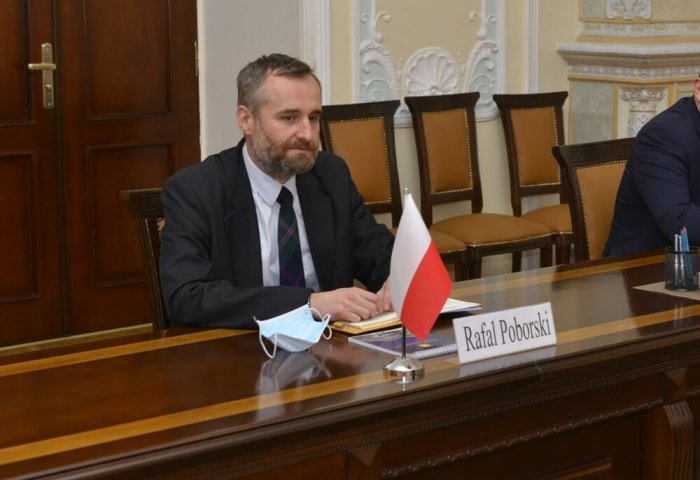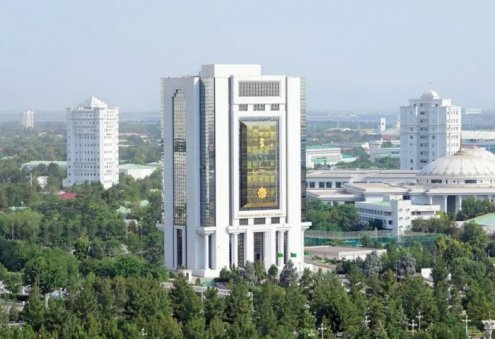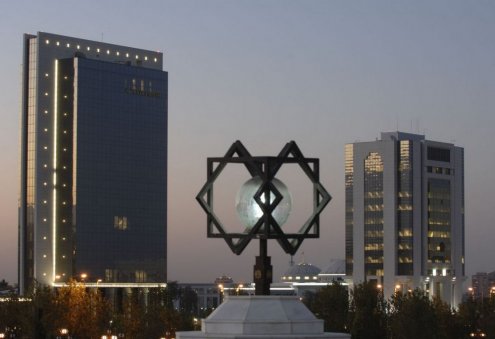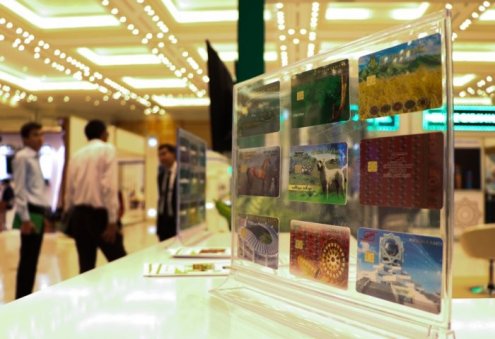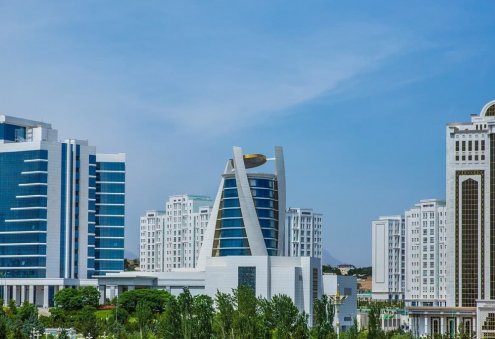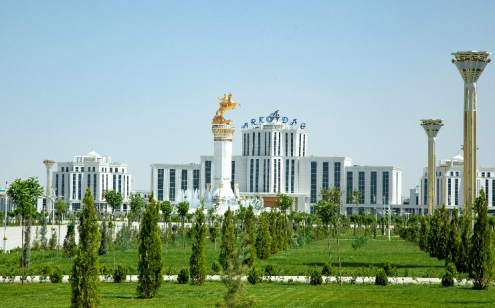Ambassador Extraordinary and Plenipotentiary of the Republic of Poland to Turkmenistan Rafał Poborski in an interview with Business Turkmenistan talks current state and potential of Turkmen-Polish ties in economy, trade and business.
Professional diplomat since 2003, Mr. Poborski held different posts in the Ministry of Foreign Affairs of Poland. Before his appointment as the Ambassador of Poland to Azerbaijan and Turkmenistan (with residence in Azerbaijan) in June 2019, he held a post of Deputy Director for Central Asia and the South Caucasus in the Eastern Department of Polish Foreign Ministry. H. E. Rafał Poborski started his term as the Ambassador in January 2020.
BT: What are the potential areas of cooperation between Turkmenistan and Poland?
H. E. Rafał Poborski: Polish – Turkmen political and economic relations are stable and friendly. The main directions of the economic cooperation between Poland and Turkmenistan are expressed in the Agreement on Economic Cooperation between our countries signed in Ashgabat in 2015. This historical document created foundations for a Polish-Turkmen intergovernmental commission for economic cooperation and helps to prepare new economic projects serving bilateral economic cooperation and liquidate barriers hampering trade and investment collaboration between the two countries. The prospects for the development of the Turkmen-Polish relations, as well as issues of mutual interest, were discussed during Turkmen-Polish political consultations on the level of the deputy ministers of foreign affairs of the two countries at the Ministry of Foreign Affairs of Turkmenistan in July 2019. A range of issues related to the strengthening of bilateral trade and economic relations was also considered, as well as the possibilities of organizing mutual high-level visits. However, the outbreak of the coronavirus pandemic last year and the travel restrictions associated with it prevented the implementation of a number of planned projects and visits. This situation also prevents me from making my first official visit to Turkmenistan so far, I started my mission as an Ambassador of Poland to Azerbaijan and Turkmenistan in January 2020, just before the pandemic.
We are ready for cooperation with Turkmenistan in many spheres and we believe it can be important offer in diversifying the Turkmen economy. Many lessons could be drawn from the Polish experience and we are ready to share them with our partners. The Polish economy is well diversified and offers a wide range of high-quality products with a competitive quality to price ratio. We see potential to further develop the cooperation in the agricultural sector, including in trade of food products, raw materials, machinery, electromechanical and chemical industry, construction, transportation, environmental protection technologies and many more.
Looking at Turkmenistan, Polish companies see not only the local market, but also the opportunities that your country creates in the context of entering further regional markets. Turkmenistan due to the unique geographical location could provide Polish exporters an access to the new markets. It should be even easier taking into account transport corridors that are being developed in the region.
For producers and exporters from Turkmenistan, Poland, with its favorable geographical location, may become a window to European markets. It is worth remembering that Polish logistics and transport companies occupy one of the strongest positions on the market of this type of services in the EU.
Cooperation in the tourism sector has development potential for many areas ahead. The growth of tourism has become an important component of Poland's economic progress and these experiences could be successfully used by Turkmenistan.
Poland has unique experiences also in other fields, and use of them could be of benefit to Turkmenistan. For example, we can indicate forest management or breeding thoroughbred horses, in which Poland is one of the world's leaders. In five of the seven championships during the European Championship 2020 held in Prague, Polish-bred horses won four gold, five silver and three bronze medals (according to the observers, the European Championship 2020 was overshadowed by the Polish-bred horse competition).
It is also worth adding that Polish-Turkmen cooperation is developing in the area of culture, an example of which is joint archaeological work carried out in Turkmenistan. The Polish-Turkmen expedition in the Sarakhs oasis has conducted studies since 1995 at such sites as Old Sarakhs, Mele Hairam, Gurukly Depe and Topaz Gala Depe. The field of research conducted by the expedition has resulted in the discovery of about 150 sites in Sarakhs and Tejen districts, dating from Bronze Age to the Islamic Period. A cooperation plan in this area for the coming years has recently been agreed between University of Warsaw and the Ministry of Culture of Turkmenistan.
Our cooperation is progressing in the field of education too. For example, only in the 2020/2021 academic year, a total of 77 students from Turkmenistan are studying at Polish universities. Young people from Turkmenistan could find a perfect conditions to develop their scientific portfolios in Poland while getting acquainted with modern society and culture of one of the biggest European Union member states.
BT: How do You characterize overall bilateral trade relations between the countries?
H. E. Rafał Poborski: According to the Polish data, value of goods exported from Poland to Turkmenistan in the 2020 exceeded 30 million USD (an increase by almost 20% y-o-y) and Turkmen exports to Poland reached almost 3,5 million USD (an increase by over 320% y-o-y). It is worth noting that the increase in bilateral trade turnover has taken place even despite the pandemic, which obviously hinders cooperation not only in trade. This proves that regardless of the obstacles and difficulties, Polish and Turkmen entrepreneurs are interested in developing mutual cooperation and our markets are mutually attractive to each other. We hope that this positive trend will continue, although in the first months of this year we observe a negative dynamics of Polish exports to Turkmenistan (in the first quarter of this year the value of Polish exports to Turkmenistan counted in USD fell by over 46% y-o-y), while Turkmen exports to Poland continued to grow (by almost 70% y-o-y). We hope that these declines in Polish exports are temporary and we will return to the positive trend over the year, as we observe a the growing interest of Polish companies in the distant, but also attractive Turkmen market.
Of course, those figures are not satisfactory neither to Poland, nor to Turkmenistan. When the international situation becomes more predictable we need to work much more harder to increase our economic cooperation. We have instruments which should allow to achieve this goal, I mean first of all the Agreement on Economic Cooperation between our countries mentioned above. In 2017 the Polish Investment and Trade Agency was established with its network of Foreign Trade Offices including one in Tashkent , which could help to facilitate cooperation with Turkmen market and assists companies from Poland and Turkmenistan to increase cooperation.
BT: What are the main products in the trade turnover between two countries?
H. E. Rafał Poborski: Polish exports to Turkmenistan are quite diversified. Nearly 30% of Polish exports are products made of stone (marble, travertine), plaster, cement, mica etc. The remaining 70% varies greatly. Machines and mechanical devices (like dish washers, devices for cleaning, drying, etc.) are an important part, as well as agricultural machinery and various vehicles. An important part, with a high growth potential, are products of the chemical and related industries, mainly Polish pharmaceutical and cosmetic products, which are appreciated all over the world. Another part of Polish exports with a potential of growth is the furniture industry. A visible part of Polish exports to the Turkmen market are plastics and articles derived from them (i.e. polymers, polyacetals, polyethers and epoxy resins). Agri-food products also constitute a significant part of the structure of Polish exports (meat and vegetable products, fruit, vegetable and milk preserves, drinks, etc.).
When it comes to exports from Turkmenistan to Poland, it is almost 100% dominated by fabrics and textiles (mainly cotton, various types of cotton yarn, cotton fabrics). Cotton and cotton products from Turkmenistan are appreciated by Polish recipients and consumers, which is not surprising given the centuries-old "textile traditions" in Turkmenistan. There is a great potential to increase their presence on the Polish market. I am also convinced that with the modernization of Turkmen economy and the emergence of modern production lines in other spheres of industry, new opportunities will open up for Turkmen exporters on the Polish and European markets.
BT: Could You provide information on the developments in the Turkmen-Polish transport cooperation, as well as on Trans-Caspian International Transport Route?
H. E. Rafał Poborski: We note the growing position of Turkmenistan as an international transport hub between the countries of Central Asia and Europe. This creates particularly good conditions for the development of bilateral economic cooperation. Poland considers developing transport and logistics routes between Europe and the East as a high priority. As it was mentioned above, Poland is the European "power" when it comes to the share of Polish companies in the EU logistics and transport services market. In this context, we observe a growing number of Polish transport companies providing comprehensive transport services for companies interested in delivering goods to the Turkmen market and from Turkmenistan to European markets.
Regarding the Trans-Caspian International Transport Route, Poland considers this route a promising project for cooperation with Turkmenistan both directly and through international networks. This route can be the basis for intensifying transport cooperation between Poland and Turkmenistan. It should be remembered that he Polish company PKP LHS, one of the largest European cargo carrier, joined this project in June 2017 as an associate member. PKP LHS has cooperation with Turkmenistan under the agreement on international rail freight traffic. Despite the global economic crisis associated with the pandemic, the number of entities cooperating within the Trans-Caspian transport route is only growing. The important part of this route is Euroterminal Sławków in Southern Poland. It is a logistics hub with great potential for further distribution of freight, its concentration and shipment back. The terminal has several logistics advantages for the customers including its broad-gauge railway link and geographical location. From Sławków the containers could be easily delivered to other European countries by rail or road. The first container train from Xi’an (China) to Sławków arrived at the final destination on January 2020.

